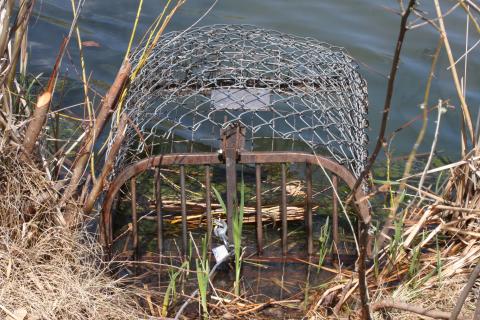Have a plan before you put out a cage trap - New Hampshire
Have a plan before you put out a cage trap
Know what you are going to do with the animal if you catch it
Many homeowners try to resolve wildlife conflicts by using cage traps (such as Havahart® traps) that catch but do not kill the animal. Cage traps can be effective wildlife management tools, but here's the "catch" — before you set that trap, you need to have a PLAN for what you are going to do with the animal and how you are going to do it. It's easy to set a trap, but not so simple to determine how and where to release the animal. Consider these tips BEFORE you set a trap:
- Call USDA Wildlife Services at (603) 223-6832 for advice on dealing with nuisance animals. Their trained staff will guide you to a workable solution.
- If Wildlife Services is not able to resolve your problem, they can refer you to a licensed Wildlife Control Operator (WCO) who can resolve the problem for a fee. Some WCOs will pick up trapped animals for a fee. Make arrangements in advance – BEFORE you set a trap.
- The NH Fish and Game Department does not lend out traps due to the potential for injury from bites, scratches, and disease exposure.
- NH Fish and Game personnel are not generally available to relocate or remove trapped animals. Responsibility for the transport and release of trapped animals falls to the person who sets the trap. Note that the potential for the inadvertent capture of a skunk is high and that handling skunks requires special skills and an action plan.
- Individuals handling or transporting wildlife should take precautions to avoid potential disease exposure. For safety reasons and to avoid spreading a disease to a new area, sick animals should not be transported.
- Do not physically handle a trapped animal or expose yourself to animal bodily fluids, including saliva; this can expose you to wildlife diseases such as rabies.
- Consider where you place the cage. During summer months, traps should be placed in shaded areas to avoid overheating. During winter months, traps should be protected from wind, snow and excessive low temperatures.
- Do not leave an animal confined in a cage trap, especially if exposed to heat or cold.
- Check traps frequently to minimize trauma to captured animals. At a minimum, traps should be checked at dusk and dawn.
To sum things up, if you are experiencing problems with nuisance wildlife, make sure you have a plan before you employ a cage trap. Know the answer to this question: What am I going to do with this animal if I trap it and how am I going to do it?

